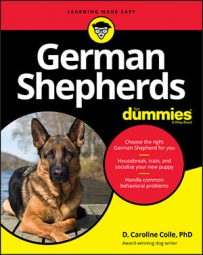Shepherds love to chew. If you leave them to their own devices, they will chew shoes, furniture, walls, and anything else that will succumb to their vice-grip jaws.
You'll be far more successful in redirecting your dog's chewing than in trying to abolish it — do so by providing him with chews that tire his active jaws. The most popular chew items are those made of rawhide. These chews are usually safe, but some serious problems have been associated with rawhide chews:
- Rawhide from other countries is often processed with poisonous substances. Insist on rawhide made in the United States.
- Chewing rawhide has a minimal effect on cleaning teeth, but it can never take the place of brushing your dog's teeth.
- Although it doesn't happen often, some dogs have had problems with impacted, undigested rawhide that have required surgery. Others have choked on large hunks of rawhide.
Safer alternatives are rawhide chews made of compressed rawhide bits, although they don't last as long as regular rawhide chews do. A variety of vegetable-based chews are also available. For gator-jawed dogs, hard rubber or nylon bones can last a long time and provide good dental cleaning.
For a special treat, a variety of animal parts are available: hooves, ears, knuckle bones, and others that are unmentionable in mixed company. Pig ears are a great treat but are high in fat and can cause diarrhea. Knuckle bones are a traditional good choice. Hooves tend to splinter and have been implicated in some problems. They're extremely hard, and if you keep them in the house, you may end up throwing them away in a fit of rage after stepping on one in the middle of the night for the tenth time.
Be careful when you handle these dog treats. Some people have caught salmonella from handling them and then placing their hands in their mouths. Dogs are apparently more resistant to salmonella.
If your dog is chewing items that were not meant for chewing, bitter-tasting sprays and liquids are available that dissuade dogs from chewing surfaces. After checking to make sure that it won't stain your items, apply these sprays to anything you don't want your dog to chew but that may be tempting — your shoes, your sofa, and so on.

